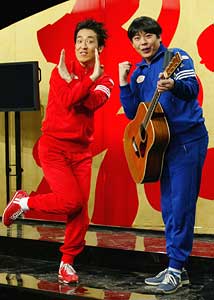|
MONTHLY NEWS Popular Words Express Wows and Whys | ||||
The Shingo Ryukogo Taisho (New and Fashionable Phrases Awards) were announced in December 2003, and the top ten words and phrases representing the trends of the year 2003 were named. Furthermore, every year a number of words and phrases that enjoyed particularly widespread currency are selected from among the top ten as winners of the annual grand prize. There were three winners this year: "nande daro," "doku manju," and "manifesto." The awards, which were held for the twentieth time in 2003, recognize words and phrases that were heard a lot during the year and provide insight into current trends in Japanese society. They are sponsored by the publisher of the annual Gendai yogo no kiso chishiki (Encyclopedia of Contemporary Words). Here is how the selection goes. First, readers of the encyclopedia volunteering as judges submit their recommendations via questionnaire. The popular choices are then officially nominated, and finally, a jury determines the top ten and the grand prize winners from among these nominations. At the awards ceremony, the prizes are presented to the individuals or organizations that are closely linked with each expression. The first of the three grand prize winners was "nande daro." This very ordinary phrase, meaning "I wonder why," was made popular by a comic duo called Tetsu and Tomo (site is Japanese only). In a song, they ask questions about small, everyday things that anyone might think of. They simply pose the questions to the audience in song with straight faces; there are no punch lines and no answers. And yet, their routine became a tremendous hit with everyone from kids to grown-ups and got everyone imitating their song and dance. The dance that Tetsu does while Tomo plays on the guitar is peculiar, very amusing, nimble, and dynamic. The moves that go with the chorus "Nande daro, nande daro" are especially simple and easy to dance, so anyone can copy them. Ten-year-old Ando Makoto of Katsushika Ward, Tokyo, is one of the many big fans of the song. He explains, "According to the advice given by Tetsu and Tomo, you can do the dance well by moving your hands as if you're sandwiching a very long nose between the backs of your hands." At home he performs a lot for his mother and grandmother, with his father playing the part of Tomo on the guitar. Along with "nande daro," two phrases related to politics shared the grand prize. The first of these, "doku manju," refers to a poison bun. The act of making covert promises and double-crossing one's comrades is sometimes described as "eating a doku manju." Just before stepping down from politics, Nonaka Hiromu of the Liberal Democratic Party criticized some of his faction colleagues for "eating a doku manju" by voting for someone other than the candidate whom the faction had agreed to support in the election for party president. Since the LDP heads the ruling coalition, the party president also fills the post of prime minister of Japan, and Nonaka claimed that these people betrayed their faction because they had been promised cabinet posts in return for their ballots. Nonaka accepted the prize for the phrase "doku manju." Kitagawa Masayasu, former governor of Mie Prefecture, won a grand prize for popularizing the word "manifesto." A manifesto is a detailed public declaration of pledges that specifically gives the time frame, financial sources, and process for achieving what is pledged, as well as numerical targets. Kitagawa has been advocating the introduction in Japan of the British practice of issuing manifestoes, and in the election for the House of Representatives that was held in fall 2003, the major parties all published manifestos. At the awards ceremony Kitagawa commented, "I hope this will set off dramatic changes in the country's politics." Past winners of the New and Fashionable Phrases Awards include "oh-ha," one of the top ten expressions chosen in 2000. The origin of this word traces back to an abbreviated form of the greeting ohayo ("good morning") that was being used in a TV show for children. Katori Shingo, a member of the popular singing and variety group SMAP, slightly adapted the expression and began saying "oh-ha" when playing the character Shingo Mama. Although the character was mainly popular with kids, the cheerful-sounding word gained currency among grown-ups as well. Looking back on what words and phrases won the New and Fashionable Phrases Awards over the years is one interesting way of remembering the recent past. NOTICE: Since October 9, 2003, Japanese names in Kids Web Japan have been written in their original order: surname first. |
 |
